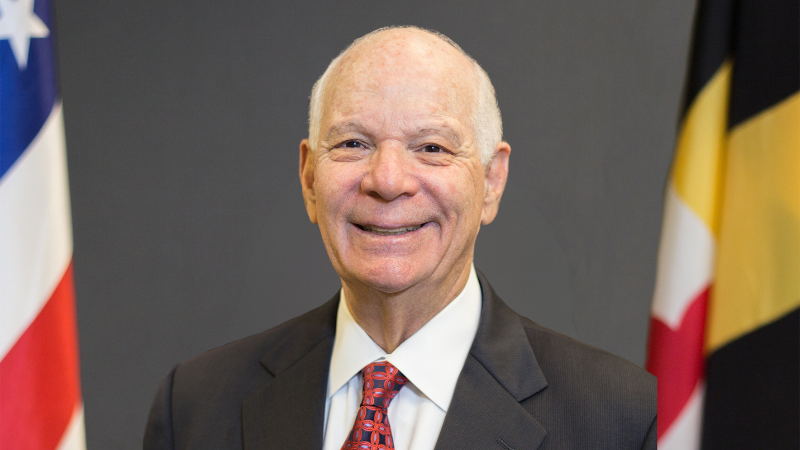Ben Cardin | Sen. Ben Cardin Official U.S. Senate headshot
Ben Cardin | Sen. Ben Cardin Official U.S. Senate headshot
Washington, D.C. – U.S. Sen. Ben Cardin (D-MD), Sen. Amy Klobuchar (D-MN), U.S. Rep. Debbie Wasserman Schultz (FL-23), Rep. Brian Fitzpatrick (PA-1), and Rep. Mark DeSaulnier (CA-10) today, announced they have re-introduced the Comprehensive Cancer Survivorship Act (CCSA), a critical piece of comprehensive legislation which will address gaps in survivorship care and develop desperately needed standards to improve the overall patient-centered quality of care and navigation needs of cancer survivors and their families.
For every cancer survivor, this deadly disease imposes vastly different and highly personal experiences. With more than 18 million cancer survivors in the United States, and 26 million expected by 2040, there is an urgent need to empower them with the best possible resources and care to overcome this terrible disease. The CCSA will set new standards of care to ensure the best and most seamless experience for survivors, their families, and caregivers, throughout their survivorship journey, from diagnosis to end of life.
“Living with or surviving cancer is personal for so many families across our nation, including the more than 35,000 Marylanders who are diagnosed each year. Thanks to increased access to preventive care, which leads to early detection, the rate of cancer survivorship continues to grow,” said Senator Cardin. “Our legislation recognizes the importance of investing in improving quality of life and long-term care of cancer survivors who have bravely fought and won their battles against cancer.”
“As a result of advances in early detection and access to effective treatments, more people are recovering after their cancer diagnoses. That’s why we must do everything we can to improve care services and quality of life for cancer survivors,” said Senator Klobuchar. “This bipartisan legislation will do just that, ensuring that more survivors receive comprehensive, coordinated post-diagnosis and post recovery care that addresses their unique treatment needs throughout the course of their life.”
“As a fifteen-year cancer survivor, confronting it head-on, with an all-hands-on-deck approach, is my personal and professional mission. With the Comprehensive Cancer Survivorship Act, I am proud to introduce far-reaching legislation that better enables cancer survivors to choose their own path, provides them agency and autonomy over their personal health experiences and decisions, and addresses the entire survivorship continuum of care,” said Congresswoman Wasserman Schultz. “From the point of diagnosis, through active treatment and transitions to primary care, until the end of life, this legislation sets the standards of care that all survivors need and deserve. The CCSA confronts care planning, transition, navigation, workforce, education, and awareness, and empowers survivors with the best possible resources and care to overcome this terrible disease. NO survivor or family should be left in the wilderness to navigate this disease or its aftermath.”
“The physical, emotional, and financial burdens cancer patients experience do not end after they become survivors. A standard of care for those who beat cancer is long overdue,” said Congressman Fitzpatrick, co-chair of the Congressional Cancer Caucus. “Like many Americans, the fight against cancer is deeply personal to me, and I am proud to join my colleagues in supporting cancer survivors by introducing the bipartisan, bicameral Comprehensive Cancer Survivorship Act.”
“As a survivor of Chronic Lymphocytic Leukemia (CLL), a non-curable, treatable blood cancer, I know firsthand how important it is to have a continuum of care that is compassionate, seamless, and patient-centered,” said Congressman DeSaulnier. “I am proud to join Congresswoman Wasserman Schultz and my colleagues in leading this effort to better support every cancer survivor in America by connecting them to resources and empowering them to have greater control over their care.”
The CCSA’s key pillars:
- Care Planning and Transition: Provides coverage to address the transition to primary care to help survivors develop personalized treatment care plans, standardizes processes, and consolidates treatments to guide survivorship monitoring and follow-up care;
- Alternative Payment Model: Studies existing reimbursement landscape to develop an alternative payment model to ensure a coordinated approach to survivorship care across an episode of care;
- Navigation: Develops effective and comprehensive navigation services that emphasize the continuum of care, such as follow-up and health disparities and determinants, like food insecurity, housing, transportation, labor, broadband, telehealth access, and childcare;
- Quality of Care: Establishes grants to promote utilization of navigation, employment of risk-stratification, transition to primary care, utilization of care plans, potential use of at-home care, and better use of information technology for patient experience data;
- Employment: Establishes employment assistance grants to help survivors, their families, and caregivers when faced with a range of workforce challenges; and
- Education, Awareness: Creates resources for survivors and health professionals to promote early detection, preventive care and help providers provide high-quality services.
The following organizations support the CCSA: Alliance for Fertility Preservation (AFP), American Association for Cancer Research (AACR), Association of American Cancer Institutes, American Cancer Society Cancer Action Network (ACS-CAN), American Lung Association, American Society of Clinical Oncology (ASCO), American Society for Reproductive Medicine (ASRM), Baptist Health South Florida, Breast Care for Washington, Brem Foundation, Cancer Support Community (CSC), CancerCare, Children’s Cancer Cause (CCC), Disability Rights Legal Center, Emory University Asian American Studies, FORCE: Facing Our Risk of Cancer Empowered, Gilda’s Club of South Florida, Leukemia & Lymphoma Society, LUNGevity Foundation, Lymphoma Research Foundation (LRF), Malecare and the National LGBT Cancer Project, METAvivor, Miami Cancer Institute, Moffitt Cancer Center, National Coalition for Cancer Survivorship (NCCS), National Comprehensive Cancer Network (NCCN), Nova Southeastern University (NSU), Nueva Vida, Oncology Nursing Society (ONS), Prevent Cancer Foundation, Sisters Network, Susan G Komen, Tigerlily, Triage Cancer, UM Sylvester Cancer Center, YMCA of the USA, Young Survival Coalition
“Many pediatric cancer survivors face a multitude of lifelong health challenges caused by the toxicity of their treatment. Many lack a survivorship care and transition plan when they leave treatment and go into primary care and are unprepared for the significant health issues they may face, including hearing loss, infertility and cardiac late effects. Innovations in the Comprehensive Cancer Survivorship Act help to address the specialized needs of this population through the development of best practices to ease transitions of care. The bicameral bills would also encourage the creation of a Center for Medicare and Medicaid Innovation pediatric survivorship care demonstration model that could help to establish a standard of post-treatment transition care,” said Steve Wosahla, Chief Executive Officer, Children’s Cancer Cause (CCC).
Tigerlily Foundation is proud to support this important legislation championed by Representative Wasserman Schultz. Being diagnosed with breast cancer changed my life, and one of the most challenging times was “after” treatment ends and the lack of survivorship care. I continue to hear this issue from our patient network even 17 years later. With the number of cancer survivors growing – this means that patients will live longer – but with comorbidities and a variety of psychosocial, financial, quality of care and other needs. In addition, with the socioeconomic challenges and inequities that face BIPOC populations, we must ensure that patients have legislation that supports and protects all, especially vulnerable populations. We are honored to have worked with Congresswoman Wasserman Schultz for so many years and look forward to seeing this survivorship legislation impact the lives of patients,” said Maimah Karmo, President and CEO, Tigerlily Foundation.
“Cancer survivors face many unmet care needs that are complex and include physical and emotional symptoms, concerns about finances and social roles, and limited care coordination. The Comprehensive Cancer Survivorship Act legislation sponsored by Congresswoman Wasserman Schultz and Congressman Fitzpatrick proposes to implement much needed fundamental standards of care including care coverage and coordination that will address the unique needs of the more than 19 million cancer survivors in the US. Having these standards of survivorship care in place will benefit cancer survivors and their families and caregivers. Sylvester Comprehensive Cancer Center is proud to support this bill which will enhance our capacity to provide essential comprehensive cancer survivorship care in the South Florida community,” said Dr. Stephen Nimer, Director Sylvester Comprehensive Cancer Center, University of Miami Health System.
“The AACR commends Representatives Wasserman Schultz, Fitzpatrick, and DeSaulnier and Senators Klobuchar and Cardin for their extraordinary leadership of the Comprehensive Cancer Survivorship Act. Breakthroughs in cancer treatment have resulted in more than 18 million Americans living today as cancer survivors, and this act will provide vital resources for many of them, including supporting personalized survivorship care plans for follow-up care, navigation services, and evidence-based survivorship resources,” said Lisa M. Coussens, PhD, FAACR, Past President of the American Association for Cancer Research (AACR).
“From diagnosis to long-term survivorship, people living with cancer face many hurdles to receiving coordinated, high-quality care,” said Andrea Ferris, President and CEO of LUNGevity Foundation. “We commend Reps. Wasserman Schultz, Fitzpatrick, and DeSaulnier, and Sens. Klobuchar and Cardin for their outstanding leadership and advocacy on behalf of cancer survivors. This legislation would make numerous meaningful improvements in the delivery of cancer care, and we look forward to working with these congressional champions to make this a reality.”
“Our systems need to adapt to meet the needs for a growing population of long-term cancer survivors, as treatments become more and more effective. The ‘Comprehensive Cancer Survivorship Act’ would address critical gaps, for both adults and children, by providing coverage for vital services to ease the transition from oncology to primary care. These services include cancer care planning and coordination plus new models for workplace support. We applaud Congresswoman Wasserman Schultz, Congressman Fitzpatrick, Congressman DeSaulnier, Senator Klobuchar, and Senator Cardin for their efforts to transform our health and social systems to better serve cancer survivors,” said Robert W. Carlson, MD, Chief Executive Officer, National Comprehensive Cancer Network® (NCCN®).
“Cancer survivors, representing over 5% of the US population, have many unmet needs. By recognizing and addressing these, we can enhance their quality of life and long-term outcomes. This bill will help do that,” said Deborah K. Mayer, PhD, RN, AOCN, FAAN
“Cancer is a life-changing diagnosis, and paying for fertility preservation should be the last thing on patients’ minds. The Comprehensive Cancer Survivorship Act recognizes the importance of reproductive autonomy and will ensure that individuals facing medical treatments or conditions that may impair their fertility have equal access to preserving their reproductive options. ASRM applauds today’s introduction of this legislation, which would guarantee fertility preservation options for cancer survivors. We thank Representative Debbie Wasserman Schultz, Senators Amy Klobuchar and Ben Cardin, and Representatives Brian Fitzpatrick and Mark DeSaulnier for their leadership and dedication to providing the best standard of care for cancer survivors and their families,” said Dr. Michael Thomas, American Society for Reproductive Medicine (ASRM) President.
“We applaud Representative Wasserman Schultz, along with Senators Klobuchar and Cardin and Representatives DeSaulnier and Fitzpatrick for recognizing the distinct needs of cancer survivors and their leadership and relentless advocacy in introducing this landmark legislation. At the Cancer Support Community, we have long heard from cancer survivors about the emotional and physical challenges they face and the lack of understanding from those who think cancer ends with one’s last treatment. For this reason, we offer programs specifically for this community in person and online, and developed Cancer Transitions, our cancer survivorship educational program to prepare cancer survivors for the transition to post- treatment survivorship that meets CoC Survivorship Standards ,” said Debbie Weir, CEO, Cancer Support Community.
“Over the last 20 years, we have made tremendous strides in the treatment of lymphoma and understanding the unique needs of cancer survivors. The Lymphoma Research Foundation commends Representatives Wasserman Schultz, Fitzpatrick and DeSaulnier and Senators Klobuchar and Cardin for their co-sponsorship of the Comprehensive Cancer Survivorship Act and for recognizing that surviving cancer brings with it a set of physical, psychological, and financial needs that require ongoing attention and support. The Foundation is committed to the continued support of lymphoma survivors and their caregivers through our survivor programs and in the funding of promising lymphoma research to help ensure that more people survive cancer and go on to live full lives,” said Meghan Gutierrez, Chief Executive Officer, Lymphoma Research Foundation.
“Cancer has a lasting impact—physical, social, emotional, and financial—on the affected individual and their family. Improved screening, early detection, and therapies allow us to save more lives than ever before so understanding the needs of cancer survivors and helping them successfully navigate life after cancer is crucial. We applaud Representative Wasserman Schultz and the other bill co-leaders. This legislation will pave the way for survivors to have better quality of life, providing guidance to address short- and long-term treatment effects, and an evidence-based plan that includes screening for recurrence, new cancers, and other complications,” said Lisa Schlager, Vice President, Public Policy, FORCE.
“The American Lung Association is pleased to support the Comprehensive Cancer Survivorship Act. This bill gives individuals and their families facing a devastating diagnosis the resources to live their lives. It also gives providers the tools they need to improve treatment and quality of life for cancer survivors. The Lung Association sincerely appreciates the work of Representatives Wasserman Schultz, Fitzpatrick and DeSaulnier, and Senators Klobuchar and Cardin to improve the lives of people living with cancer,” said Harold Wimmer, President and CEO of the American Lung Association.
“Brem Foundation applauds the reintroduction of The Comprehensive Cancer Survivorship Act (CCSA) which will provide essential support for those navigating a cancer diagnosis. The groundbreaking legislation will help to advance patient centered care, which emphasizes more intentional engagement with patients and families, as well as compassion, respect, and shared decision-making. Patient centered care has also been cited in efforts to reduce health disparities including for patients in poverty and underserved communities. Passage of this bill should be a top priority for federal lawmakers,” said Dr. Rachel Brem, Chief Medical Officer, Brem Foundation to Defeat Breast Cancer.
“YMCA of the USA (Y-USA) is grateful to Representatives Wasserman Schultz, Fitzpatrick and DeSaulnier and Senators Klobuchar and Cardin for introducing the bipartisan Comprehensive Cancer Survivorship Act (CCSA). As the largest provider of in-person health and well-being programs for cancer survivors, the Y has seen unprecedented growth in demand for services for individuals living with, through and beyond cancer. Since 2008, the Y has supported more than 80,000 individuals and their families to help them heal and be well, but there are so many more who need our help. CCSA would provide resources to expand and sustain this work,” said Suzanne McCormick, President and CEO YMCA of the USA.
“We’re thrilled to see the Comprehensive Cancer Survivorship Act (CCSA) reintroduced today and thankful to our House and Senate sponsors for championing legislation to address some of the most pressing needs of cancer survivors. CCSA is critical to improving quality of life for cancer survivors by creating better systems for survivorship and follow-up care, finding best practices for patient navigators to help survivors in their transitions and expanding access to fertility preservation services. We look forward to working with Congress to move such critical legislation forward that will support the continuum of care for the nearly 18 million cancer survivors across our nation,” said Dr. Karen E. Knudsen, CEO of the American Cancer Society Cancer Action Network.
“Susan G. Komen applauds long-time cancer community champions, Representatives Debbie Wasserman-Schultz, Mark DeSaulnier and Brian Fitzpatrick and Senators Amy Klobuchar and Ben Cardin, in their efforts to support the growing number of people living with and surviving cancer in our country. With the increasing availability of screening, earlier detection and improvements in breast cancer treatments, the overall breast cancer mortality rate among women in the U.S. has declined by 41 percent over the last 30 years. However, statistics do not illustrate the challenges breast cancer patients, those living with metastatic disease and survivors face every day to maintain their health and quality of life. The Comprehensive Cancer Survivorship Act would increase access to the tools those impacted by breast cancer may need to navigate their care, wherever they are on their cancer journey,” said Molly Guthrie, Vice President of Policy and Advocacy at Susan G. Komen.
The original bill text can be found here, the section by section here, and one-pager here.
Original source can be found here





 Alerts Sign-up
Alerts Sign-up